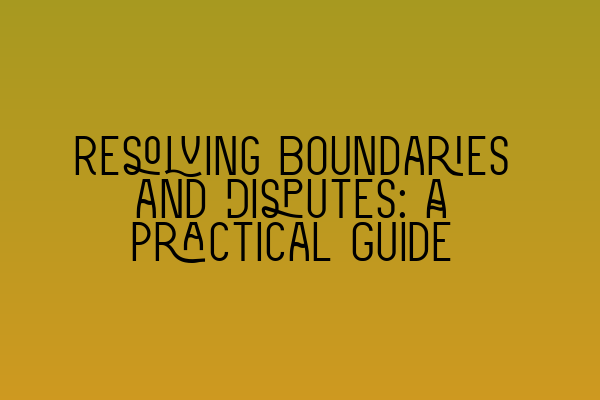Resolving Boundaries and Disputes: A Practical Guide
When it comes to property ownership, clear and well-defined boundaries are essential. However, boundary disputes are not uncommon and can cause significant stress and legal complications for all parties involved. In this practical guide, we will explore the various steps and considerations involved in resolving boundary disputes.
Understanding Boundary Disputes
A boundary dispute arises when two or more parties disagree on the location of their property boundaries. This can occur due to a variety of reasons, such as inaccurate property surveys, unclear or ambiguous legal descriptions, or encroachments by neighboring properties.
Boundary disputes can range in complexity, from minor disagreements over a few inches of land to major disputes involving multiple properties. Regardless of the size or nature of the dispute, it is crucial to approach the situation with a level-headed and rational mindset.
Initial Steps
Resolving a boundary dispute requires a systematic approach. Here are the initial steps you should take:
- Gather Documentation: Gather all relevant documents related to the properties in question, such as title deeds, property surveys, and boundary agreements. These documents will provide valuable information and serve as evidence in the dispute resolution process.
- Understand Legal Rights: Familiarize yourself with the relevant property laws and regulations in your jurisdiction. This will help you understand your legal rights and obligations regarding property boundaries.
- Communication: Open communication lines with your neighbor(s) or the opposing party to discuss the dispute. Approach the conversation with respect and a willingness to find a mutually acceptable resolution.
- Mediation: Consider engaging in mediation or alternative dispute resolution methods before resorting to court action. Mediation can help parties find common ground and reach a resolution more amicably.
Professional Assistance
While some boundary disputes can be resolved through direct communication and negotiation, others may require professional assistance. Depending on the complexity of the issue, it may be beneficial to engage the services of a solicitor specializing in property law.
A property law solicitor can provide expert advice and guidance throughout the dispute resolution process. They can review the documentation, assess the strength of your case, and help you explore all available legal options. Additionally, a solicitor can represent you in court if the dispute escalates to that stage.
If you decide to seek professional assistance, it is crucial to choose a solicitor with experience in property law and a track record of successfully resolving boundary disputes. Look for reviews and recommendations to ensure you select the right solicitor for your needs.
Court Proceedings
If all attempts at resolution fail, you may need to resort to court proceedings to resolve the boundary dispute. Keep in mind that litigation should always be the last resort, as it can be time-consuming, emotionally draining, and costly.
During court proceedings, both parties will present their arguments, evidence, and witnesses to support their case. A judge will carefully consider all the presented information and make a decision based on the applicable laws and legal principles.
It is essential to remain calm and composed throughout the court process. Your solicitor will guide you through the proceedings and represent your best interests.
Final Thoughts
Resolving a boundary dispute can be a challenging and stressful experience. However, with careful planning, open communication, and professional guidance, it is possible to reach a satisfactory resolution.
If you find yourself embroiled in a boundary dispute, it is advisable to seek legal advice as soon as possible. A property law solicitor can navigate the complexities of the legal system and help protect your rights.
For more information on related topics, you may find the following articles helpful:
- Misrepresentation in Contracts: Unveiling Deceptive Practices
- SQE Contract Law: Analyzing Landmark Cases and Influential Judicial Decisions
- Understanding Contractual Capacity: Rights and Limitations
- Interactive SQE Mock Tests for Contract Law: Test Your Knowledge
- Join Our SQE Contract Law Webinars: Expert Insights and Guidance
Remember, it is essential to approach a boundary dispute with professionalism and a commitment to finding a fair and equitable resolution. By following the steps outlined in this guide and seeking appropriate legal advice, you can increase your chances of successfully resolving a boundary dispute.
